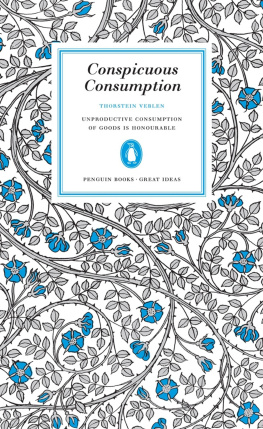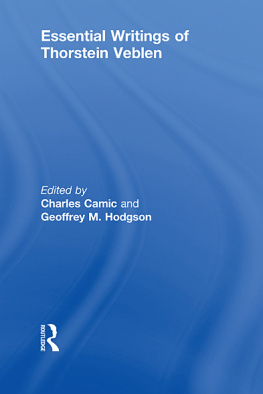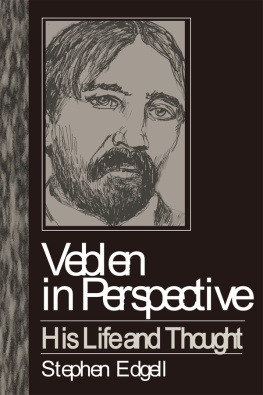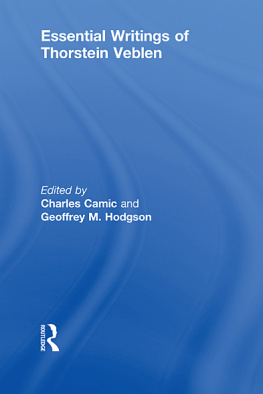Thorstein Veblen - The Place of Science in Modern Civilisation, and Other Essays
Here you can read online Thorstein Veblen - The Place of Science in Modern Civilisation, and Other Essays full text of the book (entire story) in english for free. Download pdf and epub, get meaning, cover and reviews about this ebook. year: 1932, publisher: Library of Alexandria, genre: Science. Description of the work, (preface) as well as reviews are available. Best literature library LitArk.com created for fans of good reading and offers a wide selection of genres:
Romance novel
Science fiction
Adventure
Detective
Science
History
Home and family
Prose
Art
Politics
Computer
Non-fiction
Religion
Business
Children
Humor
Choose a favorite category and find really read worthwhile books. Enjoy immersion in the world of imagination, feel the emotions of the characters or learn something new for yourself, make an fascinating discovery.

- Book:The Place of Science in Modern Civilisation, and Other Essays
- Author:
- Publisher:Library of Alexandria
- Genre:
- Year:1932
- Rating:3 / 5
- Favourites:Add to favourites
- Your mark:
- 60
- 1
- 2
- 3
- 4
- 5
The Place of Science in Modern Civilisation, and Other Essays: summary, description and annotation
We offer to read an annotation, description, summary or preface (depends on what the author of the book "The Place of Science in Modern Civilisation, and Other Essays" wrote himself). If you haven't found the necessary information about the book — write in the comments, we will try to find it.
The Place of Science in Modern Civilisation, and Other Essays — read online for free the complete book (whole text) full work
Below is the text of the book, divided by pages. System saving the place of the last page read, allows you to conveniently read the book "The Place of Science in Modern Civilisation, and Other Essays" online for free, without having to search again every time where you left off. Put a bookmark, and you can go to the page where you finished reading at any time.
Font size:
Interval:
Bookmark:

IN MODERN CIVILISATION
| THE THEORY OF THE LEISURE CLASS THE THEORY OF BUSINESS ENTERPRISE THE INSTINCT OF WORKMANSHIP IMPERIAL GERMANY AND THE INDUSTRIAL REVOLUTION THE NATURE OF PEACE AND THE TERMS OF ITS PERPETUATION THE HIGHER LEARNING IN AMERICA THE VESTED INTERESTS AND THE STATE OF THE INDUSTRIAL ARTS THE PLACE OF SCIENCE IN MODERN CIVILISATION |
IN
MODERN CIVILISATION
AND OTHER ESSAYS
B. W. HUEBSCH
Mcmxix
BY B. W. HUEBSCH
| PAGE |
| The Place of Science in Modern Civilisation |
| The Evolution of the Scientific Point of View |
| Why Is Economics Not an Evolutionary Science? |
| The Preconceptions of Economic Science. I. |
| The Preconceptions of Economic Science. II. |
| The Preconceptions of Economic Science. III. |
| Professor Clark's Economics |
| The Limitations of Marginal Utility |
| Gustav Schmoller's Economics |
| Industrial and Pecuniary Employments |
| On the Nature of Capital. I. |
| On the Nature of Capital. II. |
| Some Neglected Points in the Theory of Socialism |
| The Socialist Economics of Karl Marx. I. |
| The Socialist Economics of Karl Marx. II. |
| The Mutation Theory and the Blond Race |
| The Blond Race and the Aryan Culture |
| An Early Experiment in Trusts |
CIVILISATION
Font size:
Interval:
Bookmark:
Similar books «The Place of Science in Modern Civilisation, and Other Essays»
Look at similar books to The Place of Science in Modern Civilisation, and Other Essays. We have selected literature similar in name and meaning in the hope of providing readers with more options to find new, interesting, not yet read works.
Discussion, reviews of the book The Place of Science in Modern Civilisation, and Other Essays and just readers' own opinions. Leave your comments, write what you think about the work, its meaning or the main characters. Specify what exactly you liked and what you didn't like, and why you think so.







